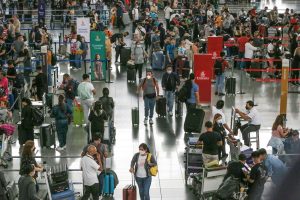The awards, first launched in 2004, recognise and reward businesses and destinations which are contributing to more sustainable and responsible tourism industry.
Winners were chosen by a group of industry experts, which met online to allow for an internationally diverse panel.
This year, India stood out in the Awards emerging as the leading country for Responsible Tourism.
Indian states have seen the benefits in Kerala from the efforts of the Responsible Tourism Mission which has been working since 2008.
The Global Award winners have been selected from the best of India and the Rest of the World Awards along with the best of those already entered for Africa and Latin America.
1.Decarbonising Travel & Tourism
Climate change is with us. It is something we now have to learn to live with. Climate change will have profound consequences for businesses in our sector and people and wildlife in originating markets and destinations.
We must also find ways to reduce the amount of carbon that people travelling and on holiday cause to be emitted.
We have to change the production and consumption of tourism – travel, accommodation, attractions and activities all need to act to reduce greenhouse gas emissions.
Through the Awards we would like to showcase examples of technologies, management systems and ways of changing consumer behaviour that have demonstrably reduced greenhouse gas emissions.
GLOBAL AWARD: Govardhan Village, Maharashtra, INDIA
https://ecovillage.org.in/
The judges for the global awards commented that there was a much stronger field this year and wanted to emphasise the importance of the clean generation of power and what can be done, by adopting technical solutions, to achieve real and significant reductions in emissions.
Govardhan Village is a 100-acre retreat centre and model farm community, a campus that showcases alternative technology and provides residential conferences and study programmes, attracting 50,000 tourists a year. The judges were particularly impressed by the effort which has been made at Govardhan to avoid emissions in the build and operational phases. With zero emissions, 210kW of solar panels deliver 184,800 units of electricity annually.
The biogas plant converts cow dung and other wet waste to the equivalent of 30,660 units. The pyrolysis plant processes plastic waste into 18,720 litres of light diesel oil 52,416 units of electricity. Energy monitoring saves 35,250 units.
The Soil Bio-Technology plants process sewage into greywater used for irrigation, saving 247,000 units required to pump water from the river and rainwater harvesting is sufficient for months beyond the rainy season. The buildings on the campus are built from compressed stabilised earth blocks (DSEB). While a typical brick wall takes 75 MJ of energy, a CSEB wall at Govardhan takes just 0.275 MJ; all materials are sourced from within 100km to reduce the carbon emissions from transport.
2. Sustaining Employees and Communities through the Pandemic
We recognise that the pandemic is far from over, and as the World Health Organization rightly reminds us, we are not safe until we are all safe. It will take many more months before travel and holiday volumes recover to whatever the “new normal” will be. We are aware that many businesses and organisations in the travel and tourism sector have worked hard to sustain their employees and the communities in which they operate with really positive impacts around the world. Many of these efforts have involved others in their supply chain and consumers.
We would like to recognise and draw attention to those who have successfully helped others, employees and neighbours alike, to weather the storm.
GLOBAL AWARD: V&A Waterfront, Cape Town, South Africa. AFRICA
https://www.makerslanding.co.za/
https://www.justicedesk.org/
The V&A Waterfront demonstrates what can be achieved by a large scale destination business that is determined to work at using its scale and dominance to benefit those otherwise excluded and marginalised.
The V&A Waterfront is a mixed-use destination on the harbour in Cape Town, “a platform that facilitates and champions art and design, to support entrepreneurship and innovation, lead the charge on sustainability and drive positive social and economic change.”
It has continued to grow employment at 3.7% annually through the pandemic. In December 2020, as cases soared, they launched Makers Landing, a food community that celebrates South Africa’s diverse cultures through food.
There is a shared incubator kitchen, a demo kitchen, eight maker production stations, a food market with approximately 35 flexible market stands, eight small co-op eateries and five anchor restaurants of various sizes. The focus is on early-stage entrepreneurs (start-up, aspirant and grassroots) with limited access to resources in the packaged foods, foodservice and catering industries. In addition to 17 small anchor businesses, 84 new jobs and eight new businesses have been created, 70% black-owned, 33% women lead.
They maintained mentorship and coaching programmes, provided grants (R591,000) and food parcels R1.3m) and continued to fund Justice Desk in Nyanga Township.
To support job retention in the SMMEs, they raised working capital to support 49 businesses, totalling R2.52 million, supporting 208 permanent and 111 temporary jobs and provided access to cash flow analysis and support and R20 million rental relief to their 270 tenants. From their urban garden, they have provided Ladies of Love, an inner-city food program that provides meals to destitute people, just under 6 tons of vegetables, from which 130 000 meals were served in 12 kitchens in two years. The V&A Waterfront might be expected to have a significant impact; it does.
The judges were particularly impressed by their innovative approach and dogged determination to continue to grow opportunities for disadvantaged and marginalised communities.
3. Destinations Building Back Better Post-Covid
In the Awards last year, we saw several destinations which were beginning to rethink the tourist volumes and market segments that they will attract post-Covid and some who were considering demarketing. The apparently inexorable increase in visitor numbers has been halted by the pandemic. Many destinations have had a “breather”. A reminder of what their place was like before the hordes arrived. An opportunity to rethink tourism and perhaps to decide to use tourism rather than be used by it.
GLOBAL AWARD: Madhya Pradesh Tourism Board, Rural Tourism Programme, INDIA
https://www.mptourism.com/
https://tourism.mp.gov.in/
One of the ambitions of the Responsible Tourism Awards is to encourage businesses and destinations to learn from others, replicate and amplify achievements. The judges for the Global Awards wanted to recognise and celebrate how Madhya Pradesh is drawing on learning from others, particularly the Responsible Tourism Mission in Kerala, to accelerate and grow its impacts for rural communities.
Madhya Pradesh Tourism Board’s Rural Tourism Program is being implemented in 60 villages in the first phase and 40 in the second phase over three years. This project gives the tourist the most authentic and ground breaking rural experience through several rural activities like bullock cart rides, farming and cultural experiences and the opportunity to stay in homestays in rural areas to generate employment and alternative business opportunities for rural communities.
Exposure visits and need-based training on homestay operations, cooking, health and hygiene, book-keeping and accounting, housekeeping, guest house management, guiding, sensitivity towards travellers, photography and blogging is being provided. The arrival of tourists has created employment for guides, drivers, artists, and other opportunities for selling goods and services to visitors. The artisans of the villages are also engaged in the diversification of the local economy through handicraft development and promotion under responsible souvenir development programs.
At the heart of the project is a commitment to inclusion, “One and all should get their fair share”. They are working with panchayats to engage people irrespective of social (physical, literacy level, gender, ability, religious, cultural barriers, etc.) and economic situation (land ownership, income levels, access to services that enhance economic opportunities, etc.)
4. Increasing Diversity in Tourism: How Inclusive is our Industry?
We travel to experience other cultures, communities, and places. If everywhere was the same, why travel? Though we seek diversity through travel, we’ve noticed that diversity is not always reflected in the industry that helps others have such experiences. Diversity is a broad term: “identities include, but are not limited to, ability, age, ethnicity, gender identity and expression, immigration status, intellectual differences, national origin, race, religion, sex, and sexual orientation.
We do not expect to find an organisation that has made demonstrable progress on all of these in the last few years. For our industry, it is about whom we employ at various levels, who we market to, the way we present the destinations we sell, the range of experiences we promote, and the stories we tell. How well do we reflect the diversity of the destinations we sell?
This category is new to the Awards this year, and we received some very diverse entries.
GLOBAL AWARD: No Footprints. Mumbai, INDIA
https://www.nfpexplore.com/product/a-queer-day-out-explore-the-queer-side-of-mumbai/
The judges were impressed by the diversity and breadth of experiences that No Footprints offers of contemporary life in Mumbai, offering genuine insight to travellers and holidaymakers. They were recognised as Best Tour Operator in the India Responsible Tourism Awards in 2020: “No Footprints enables visitors to connect with the communities which have made the city what it is over generations, to meet with them, and to hear their stories. No Footprints offer opportunities to meet with Parsees, Bohris, the East Indians and the queer* community.” In 2021 they have been recognised in the WTM Global Responsible Tourism Awards.
No Footprints curates niche travel experiences for travellers. Over the last six years, they have crafted twenty-two different Mumbai experiences and are now expanding to Delhi. Their ambition is to introduce travellers to the history, culture, and diverse peoples of Mumbai and Delhi. Amongst their most popular tours are Mumbai at dawn, street food walks, Worli Fishing Village, a Colonial Walk and their innovative tour designed to tickle the five senses, sights and sounds, including a personal experience of Bollywood, the taste of Konkan fare, the smells of the spice market and to touch Mumbai through activities in a community centre or by talking a crowded train ride.
They offer art and cookery workshops, a heritage cycle tour and an opportunity to experience the excitement of cricket. No Footprints are expanding the range of tours offered to travellers and the intensity of the experiences they provide. Queer*-friendly tours are now offered by a range of companies across India. No Footprints has gone beyond being gay friendly. “No Footprints’ Queer’s Day Out offers a full day of flirting with various aspects that frame Queer lives of people in the city. The tour includes a visit to a temple of a goddess worshipped by the traditional transgender communities creating an opportunity for conversation about cruising and Grindr, Pride, Coming Out and Drag. Queer individuals curate and lead the tour, ensuring authenticity and enabling tourists to gain an insight into the Queer culture of the city.
5. Reducing Plastic Waste in the Environment
The Covid-19 pandemic has dramatically increased the amount of single-use plastic, adding to the plastic waste crisis. Plastic waste is now entering the food chain of other species as well as ours. Once plastic enters watercourses, it ends in gyros of garbage in the oceans, on beaches and in the stomachs of fish we then eat. The industry needs to do more to reduce its use of single-use plastics and take responsibility and work with local communities and their governments to capture waste plastic with nets and floating barriers and upcycle it for as cobbles, furniture and crafts.
GLOBAL AWARD: Six Senses, Laamu, Maldives, INDIAN OCEAN
https://www.sixsenses.com/en/resorts/laamu
The Global judges were impressed with the extensive range of ways in which the management has worked to reduce the use of plastics in the resort and to reengineer their supply chain to eliminate plastic.
At Six Senses Resort on The Maldivian island of Laamu, guests join a Sustainability Tour to see innovation and experimentation in action at their Earth Lab, their hub for self-sufficiency and zero waste. The resort has set itself the goal of becoming plastic-free in 2022. This includes all front of house plastics but also food packaging. One of their biggest challenges was the styrofoam boxes local fishers were using to store their catch in before bringing it to the resort, the staff worked with packaging suppliers and local fishers and now have food delivered to the resort in cardboard boxes lined internally with panels made of hemp, jute, and wood fibres, 100% biodegradable and compostable and eliminating 8,300 styrofoam boxes every year. Through reverse osmosis followed by ultraviolet purification, filtered saltwater is desalinated, cleaned and made suitable for showering and drinking in glass bottles.
Their Leaf Garden provides 40 different herbs and greens, and the ‘Kukulhu Village’ provides eggs and chickens for their restaurants. By harvesting supplies on the island, the resort is able to significantly reduce plastic food packaging. They sell a plastic-free toolkit in the boutique, which includes a reusable water bottle, reusable bag, bamboo toothbrush, and wooden pencils. Guests are sent packing tips asking guests to leave single-use plastic products at home and take any plastic waste home where it can be better recycled. Abandoned fishing nets, washed up on the beach, are upcycled.
Fifty per cent of water sales in all Six Senses Laamu’s restaurant outlets goes into a fund providing clean, reliable drinking water to local communities in need. Six Senses Laamu stands out for having installed enough water filters (97) in the local community to eliminate over 6.8 million plastic water bottles every year. They have also conducted over 200 beach and reef cleans- including submitting data to Project AWARE- and held education sessions for all members of the public on plastic pollution and waste management.
6. Growing the Local Economic Benefit
There is still a place for CSR1.0 and philanthropy, as is evident from last year’s Sustaining Employees and Communities through the Pandemic category. However, by adapting the way they do business, accommodation providers and tour operators can create additional market opportunities for local communities in their supply chains and create opportunities to sell goods and services directly to tourists.
This diversifies the local economy and enriches the destination in both senses, creating additional livelihoods for locals and a richer range of activities, food and drink, and craft and art products for tourists. Destinations can assist these changes by, amongst other things, providing micro-finance, training and mentoring, creating marketplaces and performance spaces and providing marketing assistance.
GLOBAL AWARD: Village Ways, Mumbai, Maharashtra, INDIA
In the context of the pandemic the Global judges looked for businesses that had actively worked to sustain and develop relationships between previous and potential guests, using recommendations and referrals to generate domestic and international business through virtual tours. They have restructured their business and enhanced the skills of their staff in the Mumbai office to ensure that Village Ways can grow out of the pandemic.
When Covid struck, tourism stopped. Village Ways adapted by developing virtual tours with village communities, including cookery demonstrations, each virtual tour attracted around 200 participants, often renewing old acquaintance across the ether. Village Ways was successful in obtaining training contracts from Madhya Pradesh. They have restructured, closing their UK marketing office, planning to outsource marketing efforts in the UK, and developing further the skills of the Mumbai head office.
They are rebuilding first from the Indian domestic market. The Village Ways model is distinctive. Guests are invited to walk through the landscape from village to village with a local guide staying in purpose-built village guesthouses, owned, managed and staffed by the community. All the village committees which manage the guest houses operate transparently.
The Binsar project started Village Ways in 2005, working with five villages. They now work with 22 villages delivering tangible economic and social benefits, with employment opportunities for young people who might otherwise migrate to cities. The tourism income complements rather than replaces other income so that households do not abandon traditional work such as farming. They also promote gender equality and social inclusion.
For the full list of those being recognised from India and the Rest of the World for taking responsibility for making tourism better and further information about the entries, please visit
https://www.wtm.com/responsible-tourism/en-gb/awards/2021-winners.html







